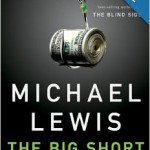This won’t be good for the Wing chau defamation suit against Michael Lewis.

In the book, there was a discussion of Wing Chau, who helped create and, in theory, manage some disastrous CDOs. He was not portrayed like the brilliant hedge fund managers who cashed in on the crash of real estate-backed securities. He was portrayed like a fool. For this, he sued Lewis for defamation.
I’m not sure if that case is ongoing or not, but the SEC has weighed in. Verdict: fraud charges against Chau for misleading investors in a CDO and for breach of fiduciary duties.
The SEC’s claims that Chau and his firm, Harding Advisory LLC, compromised their independent judgment as collateral manager to a CDO in favor of a hedge fund firm. The hedge fund, the awesomely named Magnetar Capital LLC, had invested in the equity of the CDO. Merrill Lynch structured and marketed the CDO. Harding was collateral manager for the CDO.
Specifically, the SEC claims that Harding agreed to let the hedge fund help select the subprime mortgage-backed assets underlying the CDO. This was not disclosed to investors.
The SEC claims that the influence of the hedge fund led Harding to select assets that its own credit analysts disfavored. In the tradition of criminal geniuses everywhere, in accepting the bonds, Chau wrote in an e-mail to the head of CDO syndication at Merrill Lynch:
“I never forget my true friends.”
The SEC claims that Chau understood that Magnetar was interested in investing as the equity buyer in CDO transactions, and that Magnetar’s strategy included “hedging” its equity positions in CDOs by betting against the debt issued by the CDOs. Because Magnetar stood to profit if the CDOs failed to perform, Magnetar’s interests were not necessarily aligned with investors in the CDO debt, which depended solely on the CDO performing well.
